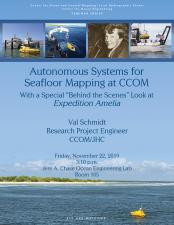Autonomous Systems for Seafloor Mapping at CCOM—With a Special Behind the Scenes Look at Expedition Amelia
CCOM/JHC
The Center for Coastal and Ocean Mapping maintains and operates several autonomous surface vehicles. These vehicles provide platforms for research in marine autonomy and specifically to develop practical methods for production seafloor mapping. This research is field-tested routinely in marine science field expeditions. In the last three years, the Center has deployed ocean-going ASVs to the U.S. East Coast, twice to the U.S. West Coast, the Arctic, the South Pacific and most recently, to a distant atoll to aid in the search for Amelia Earhart’s plane. An attempt will be made to characterize the state of the art in this fast-moving domain, describe the strategies taken by the Center, the achievements and challenges thus far and where we hope to go from here. In addition, a special behind-the-scenes look will be provided describing the mapping efforts of the Center in the search Amelia Earhart’s plane and our contribution to the National Geographic Special Expedition Amelia (aired October 20, 2019) For the local audience, a special screening of Expedition Amelia will occur Friday evening beginning at 6 pm.
Val Schmidt leads the autonomous systems group at the Center for Coastal and Ocean Mapping. He graduated with a degree in Physics from the University of the South, (Sewanee, TN) and a Master of Science degree in Ocean Engineering from UNH. He served as an Office in the US Submarine Fleet from 1994-1999 and has been operating autonomous underwater and surface vehicles for more than a decade.





